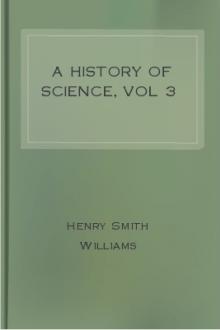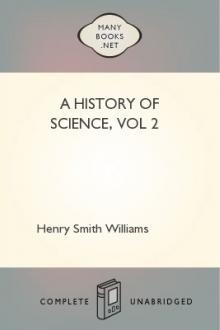A History of Science, vol 1 - Henry Smith Williams (novels for teenagers .txt) 📗

- Author: Henry Smith Williams
- Performer: -
Book online «A History of Science, vol 1 - Henry Smith Williams (novels for teenagers .txt) 📗». Author Henry Smith Williams
But, indeed, practical knowledge was, as has been said over and over, the essential characteristic of Egyptian science. Yet another illustration of this is furnished us if we turn to the more abstract departments of thought and inquire what were the Egyptian attempts in such a field as mathematics. The answer does not tend greatly to increase our admiration for the Egyptian mind. We are led to see, indeed, that the Egyptian merchant was able to perform all the computations necessary to his craft, but we are forced to conclude that the knowledge of numbers scarcely extended beyond this, and that even here the methods of reckoning were tedious and cumbersome. Our knowledge of the subject rests largely upon the so-called papyrus Rhind,[10] which is a sort of mythological hand-book of the ancient Egyptians. Analyzing this document, Professor Erman concludes that the knowledge of the Egyptians was adequate to all practical requirements. Their mathematics taught them “how in the exchange of bread for beer the respective value was to be determined when converted into a quantity of corn; how to reckon the size of a field; how to determine how a given quantity of corn would go into a granary of a certain size,” and like everyday problems. Yet they were obliged to make some of their simple computations in a very roundabout way. It would appear, for example, that their mental arithmetic did not enable them to multiply by a number larger than two, and that they did not reach a clear conception of complex fractional numbers. They did, indeed, recognize that each part of an object divided into 10 pieces became 1/10 of that object; they even grasped the idea of 2/3 this being a conception easily visualized; but they apparently did not visualize such a conception as 3/10 except in the crude form of 1/10 plus 1/10
plus 1/10. Their entire idea of division seems defective. They viewed the subject from the more elementary standpoint of multiplication. Thus, in order to find out how many times 7 is contained in 77, an existing example shows that the numbers representing 1 times 7, 2 times 7, 4 times 7, 8 times 7 were set down successively and various experimental additions made to find out which sets of these numbers aggregated 77.
—1 7
—2 14
—4 28
—8 56
A line before the first, second, and fourth of these numbers indicated that it is necessary to multiply 7 by 1 plus 2 plus 8—that is, by 11, in order to obtain 77; that is to say, 7 goes 11 times in 77. All this seems very cumbersome indeed, yet we must not overlook the fact that the process which goes on in our own minds in performing such a problem as this is precisely similar, except that we have learned to slur over certain of the intermediate steps with the aid of a memorized multiplication table. In the last analysis, division is only the obverse side of multiplication, and any one who has not learned his multiplication table is reduced to some such expedient as that of the Egyptian. Indeed, whenever we pass beyond the range of our memorized multiplication table-which for most of us ends with the twelves—the experimental character of the trial multiplication through which division is finally effected does not so greatly differ from the experimental efforts which the Egyptian was obliged to apply to smaller numbers.
Despite his defective comprehension of fractions, the Egyptian was able to work out problems of relative complexity; for example, he could determine the answer of such a problem as this: a number together with its fifth part makes 21; what is the number? The process by which the Egyptian solved this problem seems very cumbersome to any one for whom a rudimentary knowledge of algebra makes it simple, yet the method which we employ differs only in that we are enabled, thanks to our hypothetical x, to make a short cut, and the essential fact must not be overlooked that the Egyptian reached a correct solution of the problem. With all due desire to give credit, however, the fact remains that the Egyptian was but a crude mathematician. Here, as elsewhere, it is impossible to admire him for any high development of theoretical science. First, last, and all the time, he was practical, and there is nothing to show that the thought of science for its own sake, for the mere love of knowing, ever entered his head.
In general, then, we must admit that the Egyptian had not progressed far in the hard way of abstract thinking. He worshipped everything about him because he feared the result of failing to do so. He embalmed the dead lest the spirit of the neglected one might come to torment him. Eye-minded as he was, he came to have an artistic sense, to love decorative effects. But he let these always take precedence over his sense of truth; as, for example, when he modified his lists of kings at Abydos to fit the space which the architect had left to be filled; he had no historical sense to show to him that truth should take precedence over mere decoration. And everywhere he lived in the same happy-go-lucky way. He loved personal ease, the pleasures of the table, the luxuries of life, games, recreations, festivals. He took no heed for the morrow, except as the morrow might minister to his personal needs. Essentially a sensual being, he scarcely conceived the meaning of the intellectual life in the modern sense of the term. He had perforce learned some things about astronomy, because these were necessary to his worship of the gods; about practical medicine, because this ministered to his material needs; about practical arithmetic, because this aided him in everyday affairs. The bare rudiments of an historical science may be said to be crudely outlined in his defective lists of kings. But beyond this he did not go. Science as science, and for its own sake, was unknown to him. He had gods for all material functions, and festivals in honor of every god; but there was no goddess of mere wisdom in his pantheon. The conception of Minerva was reserved for the creative genius of another people.
III. SCIENCE OF BABYLONIA AND ASSYRIA Throughout classical antiquity Egyptian science was famous. We know that Plato spent some years in Egypt in the hope of penetrating the alleged mysteries of its fabled learning; and the story of the Egyptian priest who patronizingly assured Solon that the Greeks were but babes was quoted everywhere without disapproval. Even so late as the time of Augustus, we find Diodorus, the Sicilian, looking back with veneration upon the Oriental learning, to which Pliny also refers with unbounded respect. From what we have seen of Egyptian science, all this furnishes us with a somewhat striking commentary upon the attainments of the Greeks and Romans themselves. To refer at length to this would be to anticipate our purpose; what now concerns us is to recall that all along there was another nation, or group of nations, that disputed the palm for scientific attainments. This group of nations found a home in the valley of the Tigris and Euphrates. Their land was named Mesopotamia by the Greeks, because a large part of it lay between the two rivers just mentioned. The peoples themselves are familiar to every one as the Babylonians and the Assyrians. These peoples were of Semitic stock—allied, therefore, to the ancient Hebrews and Phoenicians and of the same racial stem with the Arameans and Arabs.
The great capital of the Babylonians during the later period of their history was the famed city of Babylon itself; the most famous capital of the Assyrians was Nineveh, that city to which, as every Bible-student will recall, the prophet Jonah was journeying when he had a much-exploited experience, the record of which forms no part of scientific annals. It was the kings of Assyria, issuing from their palaces in Nineveh, who dominated the civilization of Western Asia during the heyday of Hebrew history, and whose deeds are so frequently mentioned in the Hebrew chronicles. Later on, in the year 606 B.C., Nineveh was overthrown by the Medes[1] and Babylonians. The famous city was completely destroyed, never to be rebuilt. Babylon, however, though conquered subsequently by Cyrus and held in subjection by Darius,[2] the Persian kings, continued to hold sway as a great world-capital for some centuries. The last great historical event that occurred within its walls was the death of Alexander the Great, which took place there in the year 322 B.C.
In the time of Herodotus the fame of Babylon was at its height, and the father of history has left us a most entertaining account of what he saw when he visited the wonderful capital.
Unfortunately, Herodotus was not a scholar in the proper acceptance of the term. He probably had no inkling of the Babylonian language, so the voluminous records of its literature were entirely shut off from his observation. He therefore enlightens us but little regarding the science of the Babylonians, though his observations on their practical civilization give us incidental references of no small importance. Somewhat more detailed references to the scientific attainments of the Babylonians are found in the fragments that have come down to us of the writings of the great Babylonian historian, Berosus,[3] who was born in Babylon about 330 B.C., and who was, therefore, a contemporary of Alexander the Great.
But the writings of Berosus also, or at least such parts of them as have come down to us, leave very much to be desired in point of explicitness. They give some glimpses of Babylonian history, and they detail at some length the strange mythical tales of creation that entered into the Babylonian conception of cosmogony—details which find their counterpart in the allied recitals of the Hebrews. But taken all in all, the glimpses of the actual state of Chaldean[4] learning, as it was commonly called, amounted to scarcely more than vague wonder-tales. No one really knew just what interpretation to put upon these tales until the explorers of the nineteenth century had excavated the ruins of the Babylonian and Assyrian cities, bringing to light the relics of their wonderful civilization. But these relics fortunately included vast numbers of written documents, inscribed on tablets, prisms, and cylinders of terra-cotta. When nineteenth-century scholarship had penetrated the mysteries of the strange script, and ferreted out the secrets of an unknown tongue, the world at last was in possession of authentic records by which the traditions regarding the Babylonians and Assyrians could be tested. Thanks to these materials, a new science commonly spoken of as Assyriology came into being, and a most important chapter of human history was brought to light. It became apparent that the Greek ideas concerning Mesopotamia, though vague in the extreme, were founded on fact. No one any longer questions that the Mesopotamian civilization was fully on a par with that of Egypt; indeed, it is rather held that superiority lay with the Asiatics. Certainly, in point of purely scientific attainments, the Babylonians passed somewhat beyond their Egyptian competitors. All the evidence seems to suggest also that the Babylonian civilization was even more





Comments (0)